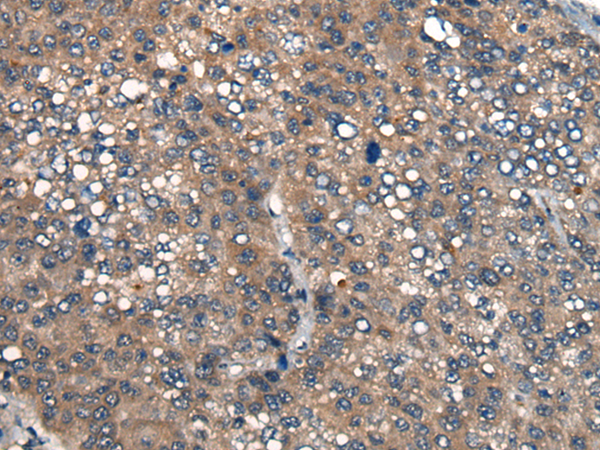
| WB | 咨询技术 | Human,Mouse,Rat |
| IF | 咨询技术 | Human,Mouse,Rat |
| IHC | 1/40-1/200 | Human,Mouse,Rat |
| ICC | 技术咨询 | Human,Mouse,Rat |
| FCM | 咨询技术 | Human,Mouse,Rat |
| Elisa | 1/5000-1/10000 | Human,Mouse,Rat |
| Aliases | PCMT; PPMT; PCCMT; HSTE14; MST098; MSTP098 |
| Host/Isotype | Rabbit IgG |
| Antibody Type | Primary antibody |
| Storage | Store at 4°C short term. Aliquot and store at -20°C long term. Avoid freeze/thaw cycles. |
| Species Reactivity | Human, Mouse, Rat |
| Immunogen | Synthetic peptide of human ICMT |
| Formulation | Purified antibody in PBS with 0.05% sodium azide and 50% glycerol. |
+ +
1. **"Targeting RAS-driven cancers through inhibition of carboxyl methylation of RAS" by Bergo et al. (2004)**
- 摘要:研究ICMT酶在RAS蛋白羧基甲基化中的作用,使用基因敲除小鼠模型证明ICMT缺失破坏RAS膜定位及信号传导,提示其作为抗癌靶点的潜力。
2. **"Development of ICMT inhibitors as potential anticancer agents" by Wahlstrom et al. (2008)**
- 摘要:报道首个选择性ICMT小分子抑制剂的开发,通过阻断RAS甲基化抑制肿瘤生长,实验中使用ICMT抗体验证抑制剂对酶活性的调控作用。
3. **"Isoprenylcysteine carboxyl methyltransferase regulates ovarian cancer cell motility" by Winter-Vann & Casey (2005)**
- 摘要:揭示ICMT通过调控RHOA甲基化影响细胞骨架动力学,使用ICMT特异性抗体进行蛋白质互作分析,提出其在癌症转移中的功能。
4. **"ICMT modulates stress granule formation via methylation of the G-protein γ subunit"** **by Manolaridis et al. (2013)**
- 摘要:发现ICMT通过甲基化G蛋白γ亚基调控细胞应激反应,利用抗体介导的免疫沉淀技术阐明其非RAS依赖性新机制,拓展了ICMT的生物学功能认知。
**Background of ICMT Antibodies**
ICMT (isoprenylcysteine carboxyl methyltransferase) is a critical enzyme involved in post-translational modification of proteins, particularly those containing C-terminal CaaX motifs, such as Ras superfamily GTPases. By catalyzing the carboxyl methylation of prenylated cysteine residues, ICMT facilitates proper membrane localization and function of these proteins, which play essential roles in cell signaling, proliferation, and survival. Dysregulation of ICMT activity has been linked to cancer, neurodegenerative disorders, and cardiovascular diseases, making it a potential therapeutic target.
Antibodies targeting ICMT are vital tools for studying its expression, localization, and mechanistic roles in health and disease. They enable detection of ICMT in various experimental models (e.g., Western blot, immunofluorescence) and aid in validating its interaction with substrates or inhibitors. Research using ICMT antibodies has revealed its overexpression in certain cancers, correlating with poor prognosis, and highlighted its role in modulating Ras-driven oncogenesis. Additionally, these antibodies support drug discovery efforts by assessing ICMT inhibition in preclinical studies.
Despite their utility, developing specific ICMT antibodies remains challenging due to the enzyme’s conserved regions and low abundance. Recent advances in monoclonal antibody technology and epitope mapping have improved specificity, enhancing their application in both basic research and translational studies. Understanding ICMT’s biology through these antibodies continues to uncover its therapeutic potential in precision medicine.
×